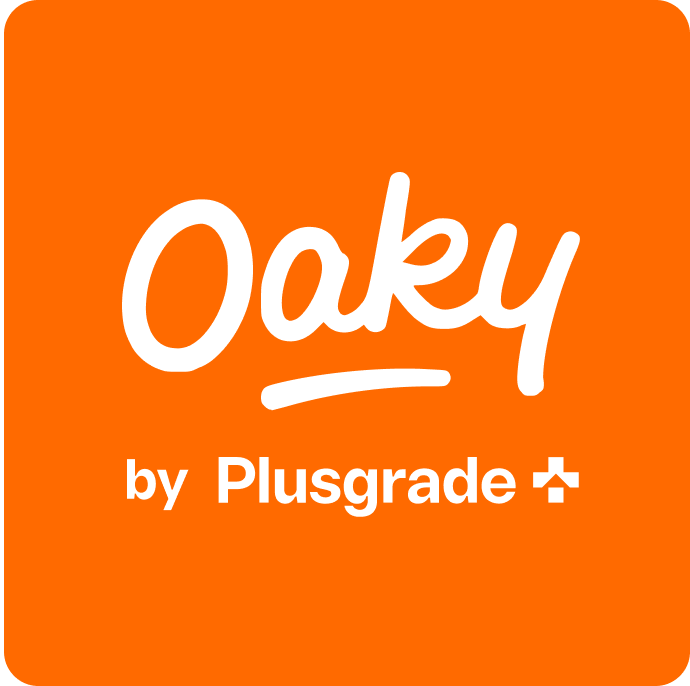12 Hotel sales strategies to maximize revenue
Oaky
•

Even with the best location and most luxurious amenities, driving hotel sales can be a struggle. You need a mix of strategies to drive revenue growth that focuses on attracting new business as well as repeat bookings.
With the following sales techniques, you can increase your hotel’s sales and profitability as well as improve the guest experience—an important factor for thriving in the hospitality industry.
What are hotel sales?
Hotel sales include all your room sales as well as service sales. This means that the selling of experiences and food and beverage (F&B) deals are added to room sales to calculate your total hotel sales.
Why are hotel sales important?
Hotel sales are the lifeblood of a successful hotel business, as they contribute to:
1. Hotel revenue
The primary reason why hotel sales is one of the most important metrics to track is that it increases your hotel revenue. It’s self-explanatory—more hotel sales translate into higher hotel revenue.
2. Guest experience
A less obvious benefit of higher hotel sales is a better guest experience. The more (and the better) hotel rooms and experiences you sell, the more bustling your hotel becomes. Having guests dine in your restaurant and use your onsite facilities like a spa creates an exciting atmosphere.
More room upgrades and experience and service sales (especially personalized ones) also shape better stays. Guests who stay in high-category rooms are more satisfied, which helps to build guest loyalty.
3. Higher hotel valuation and EBIDTA
This is especially important for hotel owners who are interested in maximizing property value and return on investment (ROI).
Strong sales directly increase total revenue, which is the foundation of EBITDA (Earnings Before Interest, Taxes, Depreciation, and Amortization). EBITDA is one of the most important metrics in hotel valuation because:
It strips out non-operating costs (debt, taxes, etc.) to focus on core performance.
Investors and operators use it to compare hotels across markets and brands.
Hotel valuations (especially for transactions, financing, or asset management) are often based on the EBITDA multiple.
Check out other factors influencing your EBITDA and hotel valuation by watching an insightful LowKey by Oaky podcast episode with Alex Slors, founder and managing director of Alex Slors Consulting.

What is a hotel sales funnel?
A hotel sales funnel maps out the journey guests take from discovering your property to making a booking. It’s traditionally been used to guide sales and marketing efforts, moving prospects through stages like awareness, consideration, and conversion.
Hotel sales funnel vs. hotel sales loop
However, the traditional hotel sales funnel often ends after the stay.
To address this flaw, there’s a shift towards adopting a sales loop. It’s a more modern, guest-centric model that emphasizes ongoing engagement and long-term revenue. It reflects how guests actually behave: returning, upgrading, and interacting across multiple touchpoints.
Let’s take a closer look at how the funnel and loop models differ and why thinking in loops will put your hotel on a straight path to revenue growth.
Hotel sales funnel structure:
Awareness – Potential guests discover your hotel (via ads, online travel agencies, your hotel website, etc.).
Consideration – They compare options, check reviews, and explore your website.
Intent – They narrow down their search and maybe check availability/prices.
Booking – They make a reservation.
Stay – They arrive and enjoy their stay.
Key characteristics:
This model is used heavily in performance and lead tracking and assumes guests follow a linear progression (they enter at the top and exit after booking or staying). However, as the focus is mostly on acquisition that ends after the stay, it misses the opportunity to generate repeat business or grow guest loyalty.
Hotel sales loop structure:
Discovery – Potential guests learn about your hotel.
Booking – They book (direct or indirect).
Pre-stay and Front Desk – You upsell and personalize offers (e.g., with Oaky).
On-stay – You deliver a service and maybe cross-sell.
Post-stay – You collect feedback, encourage rebooking or loyalty sign-up.
Re-engagement – You use email marketing, offers, retargeting ads, which often lead to a next booking if you’ve managed to make a positive impression
Key characteristics:
This approach to hotel sales uses a continuous loop, allowing guests to re-enter at any point. It uses guest data for personalization and upselling and integrates hotel sales tools like hotel upselling software, RMS, CRM, and more. The focus shifts from acquisition and single bookings to lifetime value that will generate revenue streams for sustainable revenue growth.
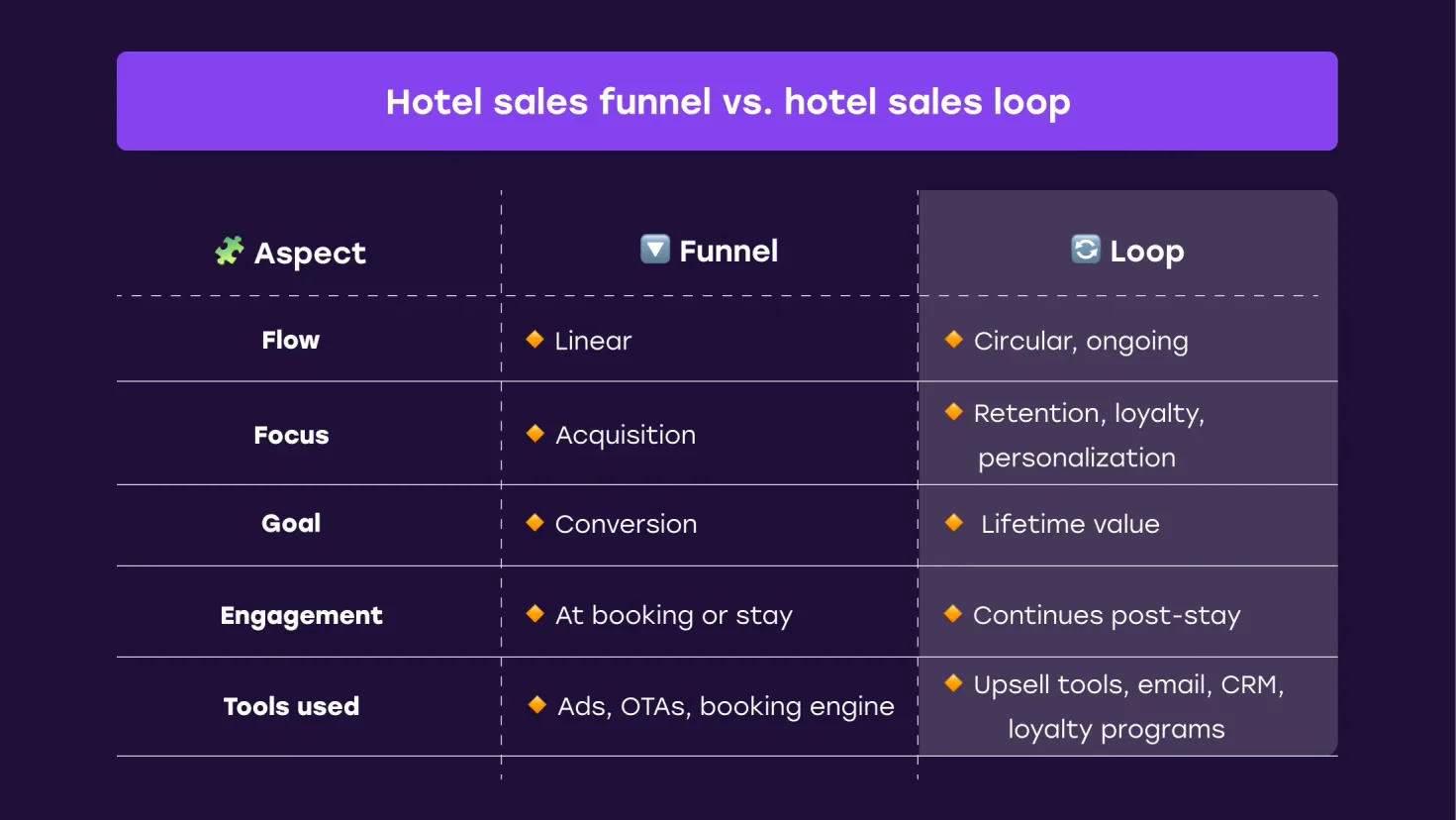
12 best hotel sales strategies to boost profitability
1. Group booking sales strategy
Group bookings present a revenue-rich opportunity. It essentially takes only one transaction to sell dozens of rooms. On top of that, your hotel becomes a popular destination for members who either want to return alone or with a different group.
It’s best practice to create a team that focuses solely on group sales. It will be their responsibility to find the right groups of travelers, connect directly with travel agents, tour operators, or event planners, and create customized packages for each type of group.
For example, you can create a package that includes spa treatments, breakfast, and venue hire for wedding parties. Then, to make your hotel a popular destination for corporate retreats, you can swap the spa treatments with an airport transfer or throw in a team-building activity.
2. Cross-promotional sales strategy
Another proactive way to improve your hotel sales is to keep your finger on the pulse of what’s happening around town. Tracking upcoming local events lets you ride the wave of community buzz, and you can make your hotel part of the celebration with timely, relevant promotions.
Take, for instance, a two-day musical festival. That’s your cue to kick off a week of themed specials, group-friendly packages, or weekend deals.
3. Direct booking strategy
Hotel managers have made significant progress in increasing direct bookings, but it remains an ongoing challenge. Success requires:
An optimized hotel website with a good booking engine
Proper pricing strategies
Investment in digital marketing
A focus on guest experience
Loyalty programs.
Then, make booking directly a more attractive option. You can, for example, offer a price-match guarantee, exclusive perks, or an app-only bundled deal.
Dive deeper into the secrets of driving direct bookings and building guest loyalty with Diego Fernández Pérez de Ponga, CEO of Port Hotels and author of The Art of Revenue:

4. Upselling and cross-selling hotel sales strategy
Upselling is a frequently overlooked revenue stream with lots of potential. It contributes to the total revenue (boosting TRevPAR) and helps sales teams drive revenue across all categories (rooms, services, add-ons) without increasing room rates. This means that hotels can stay competitive on OTAs and other channels.
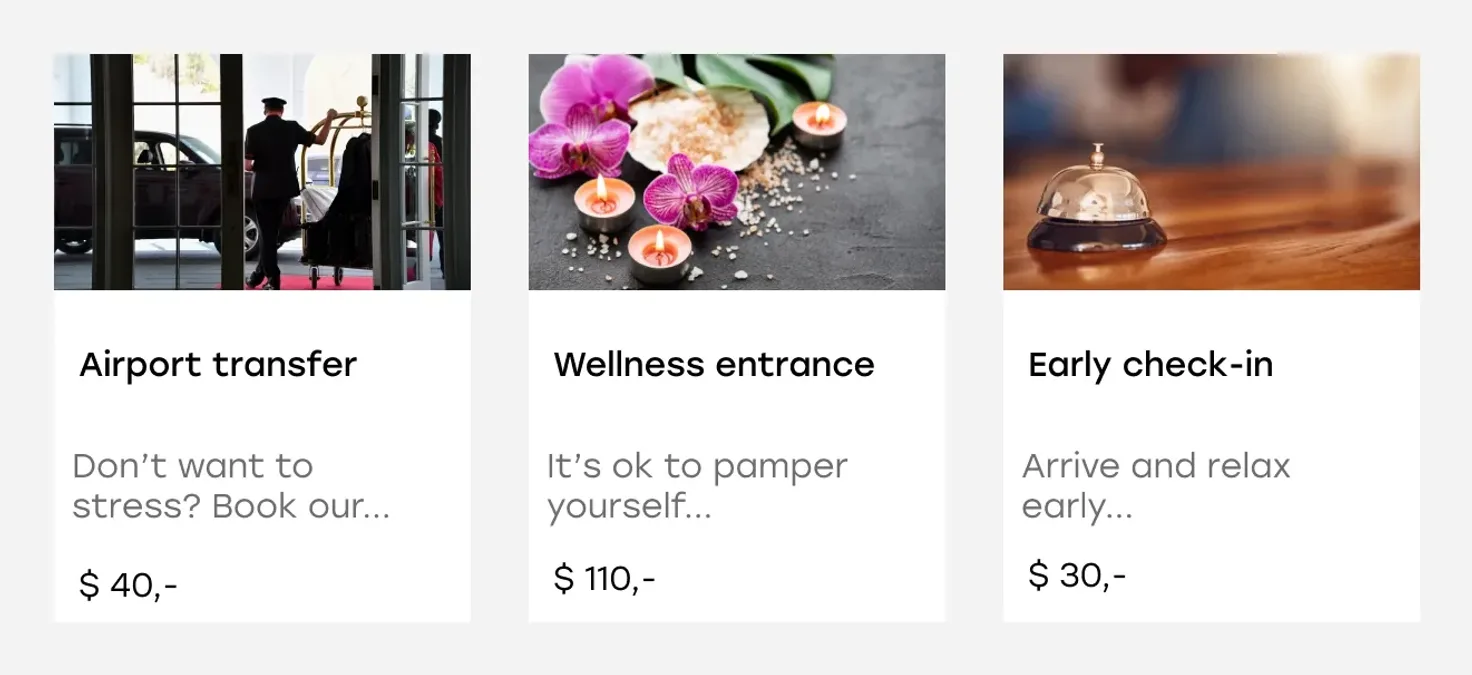
It also boosts guest satisfaction. Guests can get everything from the hotel they want (without having to look elsewhere).
When personalized and consistent (which is possible with Oaky’s upselling software), it’s easy to implement and manage. You can, for example, send pre-arrival emails that offer room upgrades and services to travelers beforehand.
This way, you can free up standard rooms, which are easier to resell and help guests secure limited options, such as:
Spa access and treatments
Airport transfers
Early check-in
Breakfast
Dining
More exclusive options, such as birthday or romantic packages, and more.
Not only does it help you maximize the average spend per guest, but it also ensures a more pleasant stay by meeting their desires and expectations even before arrival. On top of that, by using Oaky’s Front Desk Upselling, your team can focus on promoting high-margin deals at check-in.
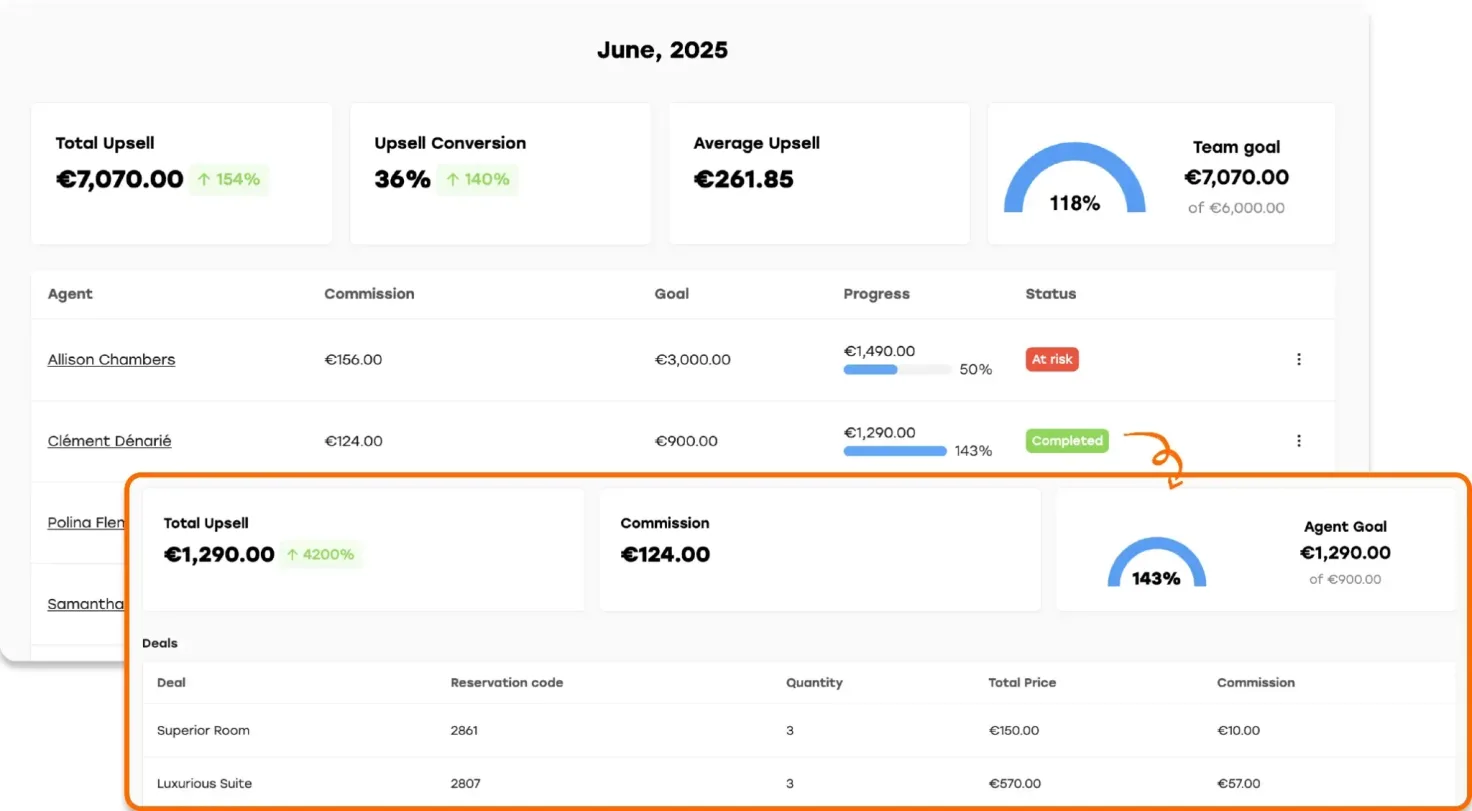
With upselling suggestions directly from the software, based on guest segments, availability, and pricing, front desk upselling becomes seamlessly integrated into the check-in process. As a manager, you can track your team’s performance, incentivize them to spark motivation, and gain valuable insights into what’s working and what’s not, helping you refine your upselling strategy even further.
5. Total revenue management sales strategy
A total revenue management strategy is a more modern approach to revenue management. Unlike traditional revenue management, it requires a holistic view of revenue. It focuses on every category and department in order to maximize revenue (F&B, spa, transportation, etc.). It also requires working smarter across departments to optimize your hotel’s profit potential and not just filling rooms
As Rebekka Berger, former Director of Revenue and Business Performance at Hotel Okura Amsterdam (now Director of Distribution and Revenue Strategy at DayBlink GPO), puts it:
“Traditionally, revenue management has focused solely on room sales. Yet, rooms account for only 50% of a hotel's income. To capture the remaining 50%, optimize earnings from other outlets like F&B, parking, and spa by applying total revenue management principles.”
Discover more in this LowKey by Oaky episode with Rebekka:

6. Loyalty programs
Loyalty programs can be rewarding to both your guests and the hotel. Guests feel valued because they’re getting exclusive perks and deals, while you’re selling more hotel rooms. More specifically, you attract guests who tend to spend more. As such, you can also expect that they’ll spend royally on upgrades, services, and experiences.
Not only does a loyalty program increase hotel sales, but it can also decrease expenses. Your marketing costs will be lower. Plus, as members are more likely to book directly through your website or app, you’ll spend less on third-party commission fees.
7. Corporate travel benefits
Corporate travel benefits like last-minute booking flexibility, early check-in/late checkout, or special rates can help you attract steady, high-value bookings. Corporate clients tend to book during the week and off-peak seasons when it’s more difficult to sell hotel rooms. What’s more, they also need other hotel services like laundry or transportation.
Instead of simply offering these benefits individually, you can take it one step further to offer a package. You can easily tailor the package aimed at corporate group bookings to make it attractive to individual business travelers.
For example, instead of including meeting rooms at a reduced rate, you can offer a complimentary breakfast. Offering exclusive perks like these to corporate clients helps position your hotel as a reliable partner for future bookings.
8. OTA optimization
While direct bookings are preferred, your hotel still needs a presence on OTAs. They attract millions of visits per month! By optimizing how your hotel appears, you get your offering in front of a huge group of potential guests.
It requires continuous effort that involves:
Updating your profile with accurate information and new, high-quality photos
Improving the descriptions of your rooms, amenities, services, and experiences by changing the keywords based on search volume
Checking room availability, inventory allocation, and rates
Monitoring key performance metrics to see how well your listing and rates are supporting revenue growth
Managing guest feedback by generating more positive reviews and responding to negative ones
9. Segmentation and personalization sales strategy
Personalization is one of the golden threads that many of these hotel sales strategies depend upon. It essentially boils down to two steps: segmenting your audience and tailoring your offering to each of these groups.
This is another sales technique that Oaky can help with. With Oaky, you can share your upselling offers with a specific segment during all the key stages of the guest journey. This way, you can ensure that the right deal will reach the right guest at the right time.
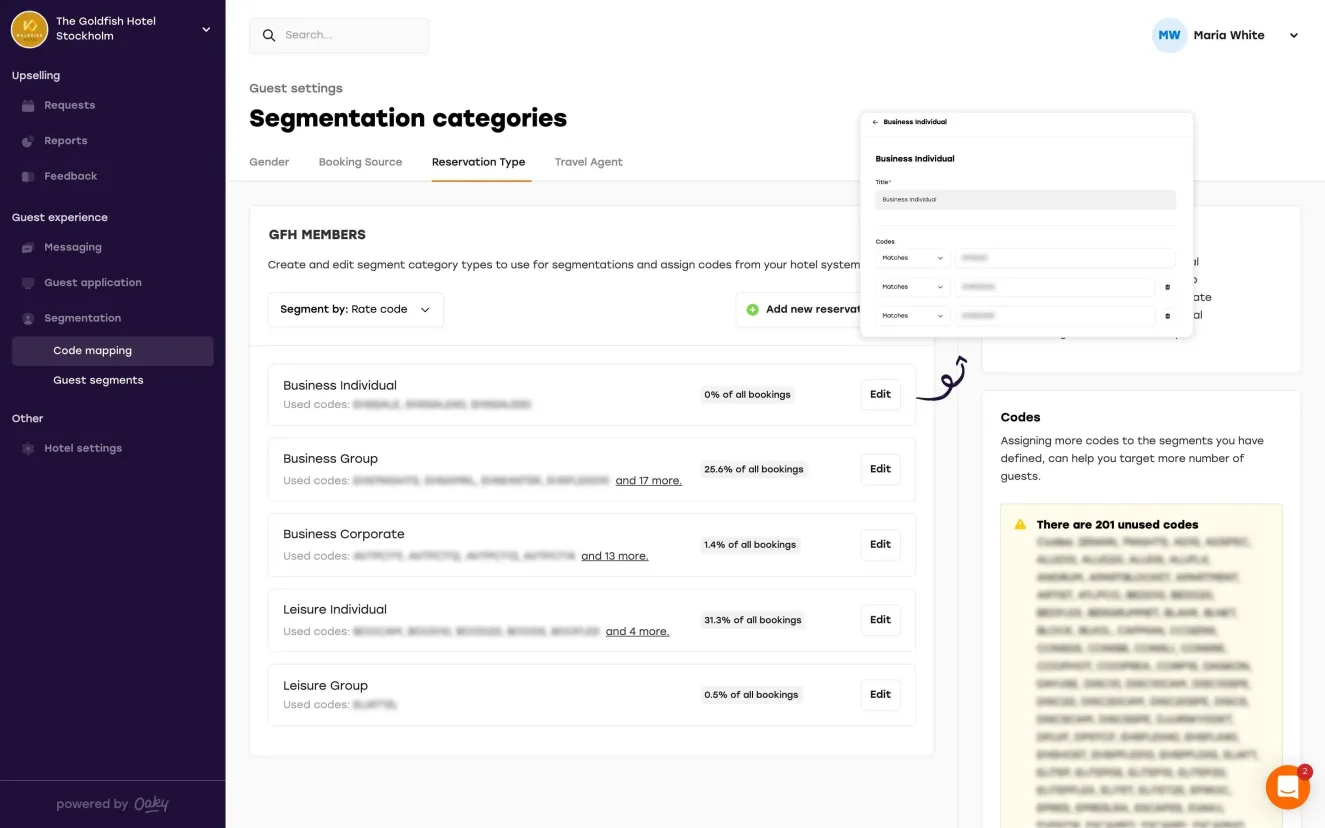
10. Re-marketing
The hotel industry has one of the highest cart abandonment rates, making re-marketing one of the essential sales techniques. Using this hotel sales strategy, you’ll re-engage potential guests who’ve shown interest but didn’t complete a booking.
You can, for example, create targeted ad campaigns across Google and social media (especially Instagram) that show special offers for the specific dates they’ve browsed. You can also apply it to your email marketing and send automated emails to remind them to complete their reservation.
11. Reputation management and guest feedback monitoring
After rooms and amenities, guest reviews and ratings are the most important factor in booking decisions, according to Accor’s The Importance of Reviews and Reputation report. What’s more, the same report found that they read an average of nine reviews per hotel, with 67% of guests ignoring reviews older than six months.
Your role is to respond professionally to reviews (71% of guests appreciate this effort) and analyze the sentiment of the feedback. Then, take the insights and improve the amenities or aspects that guests regularly complain about. Improving the customer experience doesn’t need to be a guessing game.
12. Training front desk teams to upsell
In addition to the right tech, your front desk team also needs upsell training. The first step is to ensure they’re aware of all the room types and services they can upsell. Then, teach them how to uncover upselling opportunities at check-in and communicate the unique benefits.
Video from Pablo:

5 Hotel sales software solutions to ensure consistent hotel sales
To help you implement these hotel sales strategies effectively, you’ll need the right tech. You can be all knowledgeable about marketing techniques like personalization, upselling, remarketing ads etc., but without some software, implementing these sales techniques will be ineffective and hardly scalable.
1. CRM
A customer relationship management (CRM) system like Salesforce, Amadeus Sales and Event Management, or HubSpot helps hotel teams to manage guest relationships and streamline the sales process. You can use it to collect leads and organize key guest information about past stays and preferences.
Then, it can be used to nurture these leads with automated follow-ups. Using the data you’ve stored, you can personalize these follow-ups by, for example, tailoring your promotion, which will help improve conversion rates.
2. Hotel upsell software
Hotel upsell software helps boost average guest spending to maximize the total revenue while elevating guest satisfaction. By recommending relevant upgrades like a late checkout, family room, or couples’ massage, it also lets you provide guests with what they want and book these offerings directly with the hotel, so they don’t have to look elsewhere.
For example, hotel upsell software like Oaky can help you maximize upgrade and service sales at different touchpoints of the guest journey — from post-booking to in-stay. By connecting with a variety of PMS solutions, you can make sure upselling is integrated into your daily operations and is easy to scale and manage for you and your team.
Discover how other hotels use Oaky to boost hotel sales and bottom line
3. RMS (hotel revenue management software)
A strong RMS like IDeaS, Duetto, or Atomize, ensures that your sales team sells at the right rate at the right time to optimize revenue potential. It continuously adjusts your room rates using key factors like market trends, demand, and local events for which you’ve created a cross-promotional marketing strategy.
4. Event and group booking management
Tools like Social Tables (by Cvent), Event Temple, and AllSeated make winning and managing group bookings more efficient. Depending on the tool, you’ll be able to generate branded proposals, allocate room blocks, and automate your communication.
5. Direct booking and website optimization tools
These tools help reduce dependency on OTAs, save on commissions, and increase profit margins. You’ll need a combination of direct booking tools (like Bookassist, Pegasus CRS, or Cloudbeds) and website optimization tools. You can, for example, use Net Affinity, a full-stack direct booking platform with high-converting hotel websites or Simpleview for tailored web design and booking integration.
Hotel sales trends to watch out for: personalization, automation, and AI
The future of hospitality sales is undeniably being shaped by intelligent technology. Artificial intelligence (AI), automation, and personalization are now competitive necessities. Here’s how these trends are improving hotel sales management and customer satisfaction.
1. Personalization in sales emails and offers
Generic, mass emails go unread. Personalized communication is what gets guests to take notice of your offering. Personal touches like including the recipient’s name, location, or past stay details can dramatically improve email open and conversion rates.
In practice, this is what it looks like:
A repeat guest might receive a loyalty-based discount or an offer tied to their favorite room type.
Corporate clients can get tailored proposals highlighting amenities and services relevant to their industry, such as meeting rooms, or information about how your group sales process works.
Leisure travelers might receive an email that features positive reviews your spa recently received.
As today’s tech stack makes personalization like this at scale easier than ever, hotels that ignore it will struggle to maintain the level of personal relationships that guests anticipate.
The same goes for your upselling strategy. Irrelevant offers that don’t resonate with guests are unlikely to move your revenue needle and will only frustrate guests. Smart upselling technology like Oaky can help you tailor deals to each guest and present them to the right guest at the most opportune moments.
2. AI is changing sales forecasting and pricing recommendations
AI is transforming how hotels approach sales forecasting and pricing strategy. It reduces guesswork and enhances decision-making, freeing up sales teams to focus on high-level strategy.
Instead of relying solely on historical data and manual inputs, AI systems are being used to analyze massive datasets about market trends, competitor pricing, local events, and even weather patterns in real-time. This allows revenue and sales managers to anticipate demand more accurately and react faster to changing market conditions.
AI can also automate rate recommendations, helping hotel management dynamically price rooms to maximize both occupancy and profitability. For example, if demand spikes due to a last-minute citywide event, AI can flag this and suggest optimal rate increases. The result is smarter, more responsive pricing strategies.
3. Chatbots and automation in guest communications and lead nurturing
Chatbots and automation are changing how hotels handle guest communication and sales inquiries. Your sales team can use it to answer FAQs, qualify leads, suggest room upgrades, and even complete bookings. This is especially valuable during off-hours or periods of high volume, ensuring potential guests aren’t left waiting.
For group sales, automated workflows can guide corporate clients through the sales process with personalized content, meeting invites, and positive feedback like word-of-mouth recommendations from local businesses. This way, they receive consistent, timely communication, and your sales team has more time for high-touch interactions where human insight matters most.
Final thoughts
More hotel sales generally mean better profit margins, especially when fixed costs (like staff salaries or building maintenance) remain stable while occupancy increases. Then, a smart move will be to direct the extra money to investing in better amenities and guest experiences. This, in return, will increase your hotel sales further as you’ll be able to attract big spenders and appeal to a new market that might not have been interested in your hotel’s offerings beforehand.
